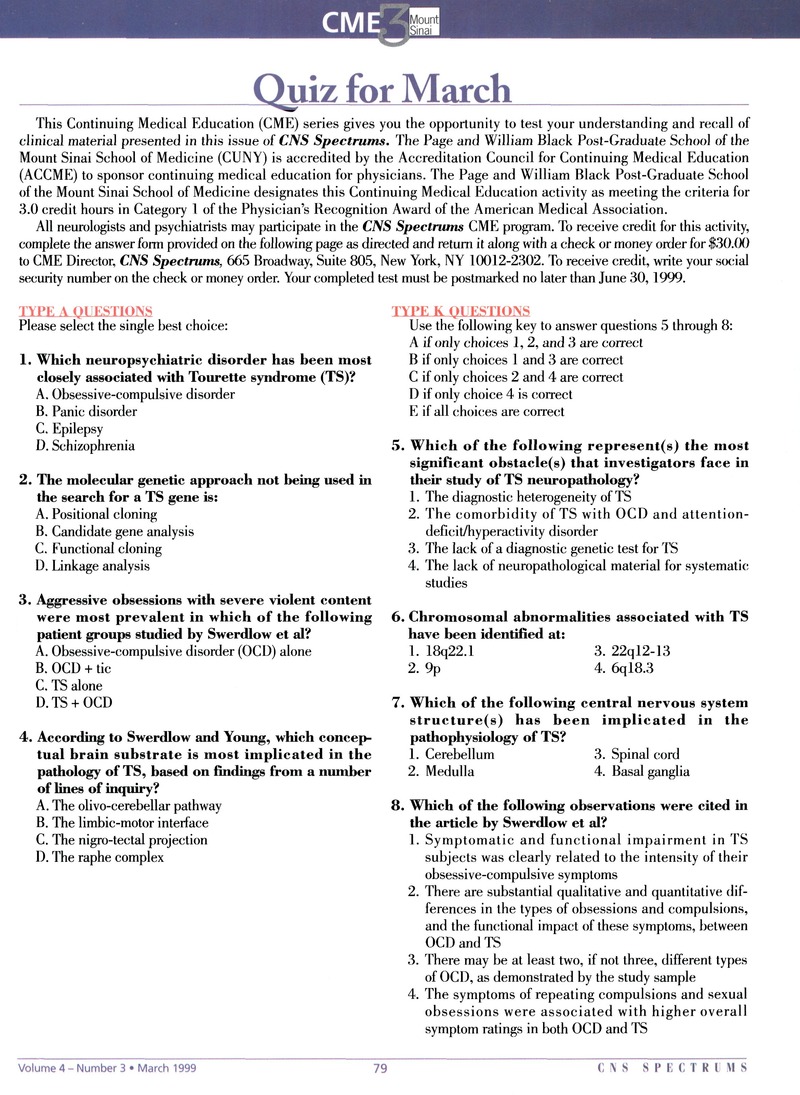No CrossRef data available.
Article contents
This continuing medical education series gives the reader the opportunity to test his/her understanding and recall of clinical material presented in this issue. Approved for 3.0 credit hours in Category 1
Published online by Cambridge University Press: 07 November 2014
Abstract
An abstract is not available for this content so a preview has been provided. Please use the Get access link above for information on how to access this content.

- Type
- Continuing Medical Education
- Information
- Copyright
- Copyright © Cambridge University Press 1999
References
REFERENCES
1.Goldman, MB. A rational approach to disorders of water balance in psychiatric patients. Hosp Community Psychiatry. 1991;42:488–494.Google ScholarPubMed
2.Illowsky, BP, Kirsch, DG. Polydipsia and hyponatremia in psychiatric patients. Am J Psychiatry. 1988;145:675–683.Google ScholarPubMed
3.Boton, R, Gaviria, M, Batelle, DC. Prevalence, pathogenesis, and treatment of renal dysfunction associated with chronic lithium therapy. Am J Kidney Dis. 1987;10:329–345.CrossRefGoogle ScholarPubMed
4.Goldman, MD, Luchins, DJ, Robertson, GL. Mechanisms of altered water metabolism in psychiatric patients with polydipsia and hyponatremia. N Engl J Med. 1988;318:397–404.CrossRefGoogle ScholarPubMed
5.Emsely, AA, Van Der Meer, H, Aalbers, C, et al. Inappropriate antidiuretic state in long-term psychiatric inpatients. S Afr Med J. 1990;77:307, 308.Google Scholar
6.Arieff, AJ. Treatment of symptomatic hyponatremia: neither haste nor waste. Critical Care Medicine. 1991;19:748–751.CrossRefGoogle ScholarPubMed
8.Siegler, EL, Tamres, D, Berlin, JA, Allen-Taylor, L, Strom, BL. Risk factors for the development of hyponatremia in psychiatric inpatients. Arch Intern Med. 1995;155:953–958.CrossRefGoogle ScholarPubMed
9.Cheng, JH, Vikos, D, Skopicki, HA, Peterson, DR, Fisher, KA. Long-term neurologic outcome in psychogenic water drinkers with severe symptomatic hyponatremia: the effect of rapid correction. Am J Med. 1990;88:561–566.CrossRefGoogle ScholarPubMed
10.Riggs, AT, Dyksen, MW, Kim, SW, Opsahl, JA. A review of disorders of water homeostasis in psychiatric patients. Psychosomatics. 1991;32:133–148.CrossRefGoogle ScholarPubMed
11.Vieweg, WVR. Commentary. Treatment strategies in the polydipsiahyponatremia syndrome. J Clin Psychiatry. 1994;55(4):154–160.Google Scholar
12.Leadbetter, RA, Shutty, MS, Hammersberg, JR, Higgens, PB, Pavlovis, D. Management of polydipsia and hyponatremia. In: Schnu, DB, Kirck, DE, eds. Water Balance in Schizophrenia. Washington, DC: American Psychiatric Press; 1996:181–199.Google Scholar
13.White, MG, Fetner, CD. Treatment of the syndrome of inappropriate secretion of antidiuretic hormone with lithium carbonate. N Engl J Med. 1975;292:390–392.CrossRefGoogle ScholarPubMed
14.Alexander, RC, Illowsky-Carp, B, Carp, S, Thompson, S, et al. A double-blind, placebo-controlled trial of demeclocycline treatment of polydipsiahyponatremia in chronically psychotic patients. Biol Psychiatry. 1991;30:417–420.CrossRefGoogle ScholarPubMed
15.Vieweg, WVR, Weiss, NM, Dand, JJ, et al. Treatment of psychosis, intermittent hyponatremia, and polydipsia (PIP syndrome) using lithium and phenytoin. Biol Psychiatry. 1988;23:25–30.CrossRefGoogle ScholarPubMed
16.Goldman, MB, Nash, M, Blake, L, et al. Do electrolyte-containing beverages improve water imbalance in hyponatremic schizophrenics? J Clin Psychiatry. 1994;55:151–153.Google ScholarPubMed
17.deLeon, J, Verghese, C, Stanilla, JK, Laurence, T, Simpson, GM. Treatment of polydipsia and hyponatremia in psychiatric patients: can clozapine be a new option? Neuropsychopharmacology. 1995;12:133–138.CrossRefGoogle Scholar
18.Greenfield, DP, Brown, JA. Psychopharmacology. In: Price, DR, Lees-Haley, PR, eds. The Insurer's Handbook of Psychological Injury Claims. Seattle, Wash: Claims Books; 1996:133–142.Google Scholar
20.Gilman, A, Rail, T, Nies, A, Taylor, P, eds. Goodman and Gilman's The Pharmacological Press of Therapeutics. 8th ed. New York, NY: Pergamon Press; 1996.Google Scholar
21.Millson, RC, Smith, AP, Koczapski, AB, et al. Self-induced water intoxication treated with group psychotherapy. Am J Psychiatry. 1993;150: 825–826.Google ScholarPubMed
22.Vieweg, WVR. Behavioral approaches to polydipsia. Biol Psychiatry. 1993;34:125–127.CrossRefGoogle ScholarPubMed
23.Pavlonis, D, Shutty, M, Hundley, P, et al. Behavioral intervention to reduce water intake in the syndrome of psychosis, intermittent hyponatremia, and polydipsia. J Behav Ther Exp Psychiatry. 1992;22:51–57.CrossRefGoogle Scholar
24.Shutty, MS, Hundley, PL, Leadbetter, RA, et al. Development and validation of a behavioral observation measure for the syndrome of psychosis, intermittent hyponatremia and polydipsia. J Behav Ther Exp Psychiatry. 1992;23:213–219.CrossRefGoogle ScholarPubMed
25.Vieweg, WVR, Godleski, LS, Graham, P, et al. Diurnal weight gain in chronic psychosis. Schizophr Bull. 1989;15:501–506.CrossRefGoogle ScholarPubMed
26.Leadbetter, RA, Shutty, MS, Higgins, PB, and Pavlovis, B. Multidisciplinary approach to psychosis, intermittent hyponatremia, and polydipsia. Schizophr Bull. 1994;20:375–385.CrossRefGoogle ScholarPubMed


